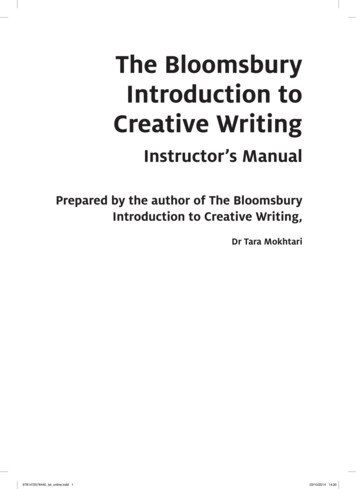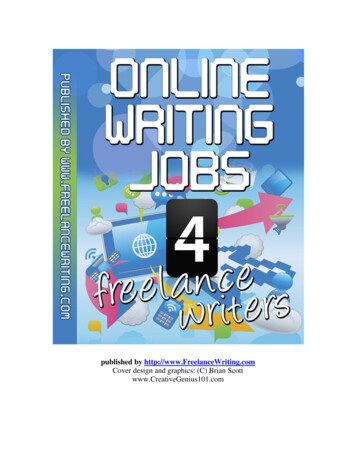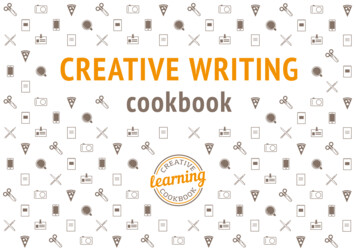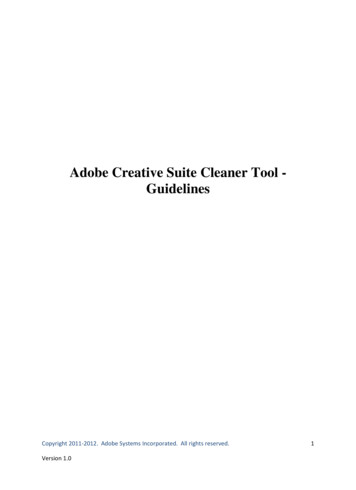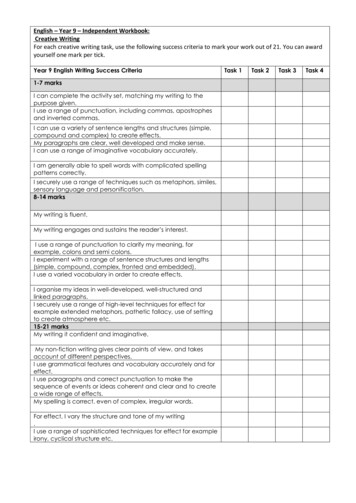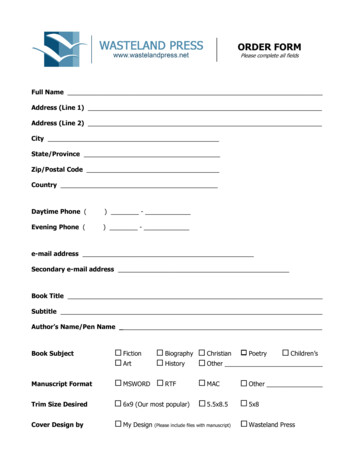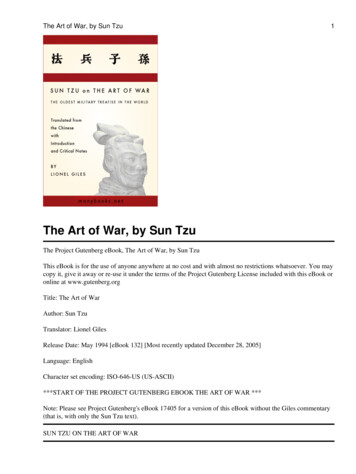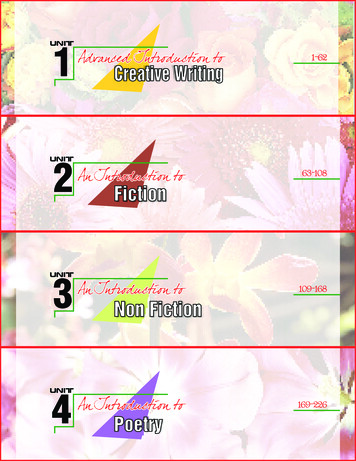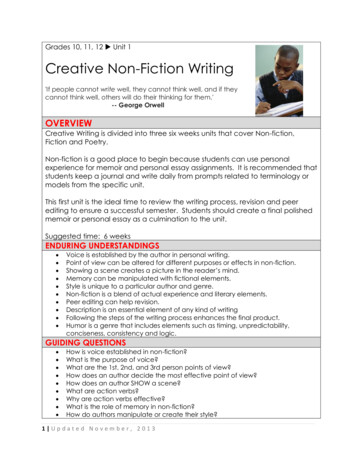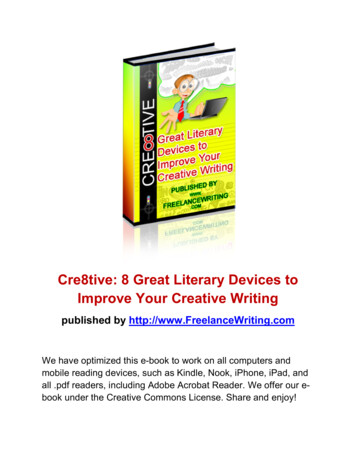
Transcription
Cre8tive: 8 Great Literary Devices toImprove Your Creative Writingpublished by http://www.FreelanceWriting.comWe have optimized this e-book to work on all computers andmobile reading devices, such as Kindle, Nook, iPhone, iPad, andall .pdf readers, including Adobe Acrobat Reader. We offer our ebook under the Creative Commons License. Share and enjoy!
2Cre8tive: 8 Great Literary Devices to Improve Your Creative Writingpublished by http://www.FreelanceWriting.comLEGAL NOTICE:The Publisher has strived to be as accurate and complete as possible in the creation of thisreport, notwithstanding the fact that he does not warrant or represent at any time that thecontents within are accurate due to the rapidly changing nature of the Internet.While all attempts have been made to verify information provided in this publication, thePublisher assumes no responsibility for errors, omissions, or contrary interpretation of thesubject matter herein. Any perceived slights of specific persons, peoples, or organizations areunintentional.In practical advice books, like anything else in life, there are no guarantees of income made orimprovement of skill. Readers are cautioned to reply on their own judgment about theirindividual circumstances to act accordingly.This book is not intended for use as a source of legal, business, accounting or financial advice.All readers are advised to seek services of competent professionals in legal, business, accounting,and finance field.We encourage you to save or print this book for easy reading.You may freely distribute this ebook to others without prior permission from thepublisher or author, as long as it is NOT altered and this ebook is distributed in itsentirety.You may freely give away this ebook, bundle it with other products, give it away asa free bonus product, or link to www.FreelanceWriting.com to download thisebook. You may not sell this ebook for money.For more FREE e-books on freelancing, iters.php
3Cre8tive: 8 Great Literary Devices to Improve Your Creative Writingpublished by http://www.FreelanceWriting.comBeing A Creative WriterA writer who wants to write exceptional articles, stories, plays, and novels must knowthe importance and impact of each sentence, much like a golfer must know the preciseposition of every finger on the club, the bend of the back, the position of the head, andthe rhythm of the swing. Like threads of different colors fed into a loom, sentenceelements will rush into the writer's mind as a formless collection of words, phrases,clauses, and sentences. The writer's task is to assort, assemble, and re-assemble to createan attractive and original story. The writer must consider every sentence a specialproblem; he must experiment with it, cast it and recast it in his mind or on paper, taketime, consider it as a solitary unit and as a part of the whole, return to it again and againif necessary, and leave it at last only when he is thoroughly satisfied.A writer's enjoyment -- like the enjoyment of a painter, a sculptor, a dancer, a singer, oran actor -- derives from the processes of his art from the planning, the constructing, thejoining, the polishing, the exercise of skill, the conquest of problems arising with everysentence, the dexterous juggling of all the elements that go to make good writing (i.e.words, sentences, sounds, associations, ideas, arrangements, spaces, divisions,continuity, suppressions, intensifications, and all the rest). Anyone who expects to writea great deal in his life must learn about his art, including all its methods, devices, andeven tricks. Then he must apply it to every word, phrase, clause, and sentence that hewrites.
4Cre8tive: 8 Great Literary Devices to Improve Your Creative Writingpublished by http://www.FreelanceWriting.comSUSPE SE(An important idea hinted at in the beginning but reserved for the end makes forsuspense.)How do novelists Mary Higgins Clark, James Patterson, Stephen King, and AgathaChristie create spine-chilling suspense in their stories? They follow a simple three-stepwriting formula.Suspense in writing, as in life, is created by three things:1. a hint,2. a wait,3. and a fulfillment.An important idea hinted at in the beginning of your article or story, but reserved for theend makes for suspense. The hint may either be an open statement or a vague suggestionthat something important will soon happen; or it may be a situation that, in its verynature, is certain to result in an important outcome -- like a war, a serious illness, or theapproach of final examinations.Suspense catches the reader's attention, and then holds his interest by the implicitpromise of an impending result of some significance. Suspense is often an unsuspectedquality that makes writing vivid and nervous, instead of dull and weak.
5Cre8tive: 8 Great Literary Devices to Improve Your Creative Writingpublished by http://www.FreelanceWriting.comSuspense is the opposite of surprise, and is a more effective instrument. Surprise lastsbut an instant, does not hold the reader for more than a minute, and immediatelybecomes a memory. Suspense may last and last; it will hold the reader's intense interest,sometimes lasting hours or days (as with a good novel).Sometimes a writer can create suspense by a series of items moving toward a climax, asin the following sentence:"He longed for an education; he made plans to obtain one; he saved his money; hesacrificed his pleasures; he endured privations and then, at the age of twenty-four, hewas killed in Iraq."In such a sentence, suspense builds up as each clause succeeds another. Sometimes amere periodic sentence creates suspense. A sentence like, "The speeding automobilewhirled around the corner on two wheels with a terrifying scream of rubber tires onpavement," is much less suspenseful than this: "On two wheels, and with a terrifyingscream of rubber tires on pavement, the speeding automobile whirled around thecorner." We might include most, or all, of these literary devices under a heading like"lengthy suspended grammatical structure."A writer may create suspense by a definite statement that something important is aboutto happen later in his story, like this: "In the story that follows, I will tell you how JohnJones died, and then returned to life." Or like this: "After we have examined anddiscarded some false solutions of our problem, I will tell you what seems to me the onlytrue and satisfactory solution." Such advance notices make the reader know for certain
6Cre8tive: 8 Great Literary Devices to Improve Your Creative Writingpublished by http://www.FreelanceWriting.comthat he is waiting for something important; this literary device puts the reader in a stateof suspense.Sometimes a brief enumeration of topics the writer intends to discuss will make thereader aware that he is waiting for something important. For example, a writer mightsay, "In this article I will discuss, first, the historical background of our presentdifficulty; next, the immediate reasons why the difficulty has suddenly grown sotremendous; and finally, the most practicable means by which we can extricateourselves from the difficulty." A statement like this creates an almost unconscious, butgenuine, suspense in the reader. Even a bare statement such as, "I wish to discuss threepoints in this article," will keep the reader alert and forward-looking through Points Oneand Two. All that is required for suspense is a hint, a wait, and a fulfillment.A well-matched conflict always makes for suspense. Even when the main purpose of awriter is not to attack anybody else's doctrines, but to give new information or to clarifyan original idea, the writer may often profit by deliberately creating a conflict at thebeginning of his exposition. He may do this by referring to mistakes that other peoplehave made, or by outlining opinions with which he says he differs.
7Cre8tive: 8 Great Literary Devices to Improve Your Creative Writingpublished by http://www.FreelanceWriting.comCLIMAX(Details, examples, and ideas should be arranged in the order of climax.)The order of climax is the order of steadily increasing importance. This principle appliesto a series of related or parallel items that a writer uses three or more in number. Theitems may detail descriptions or expositions, examples and illustrations of an expositionor argument, or lists of causes, effects, and reasons. Building climax in a story demandsthat the writer presents the least important of these first, the next most important next,and the most important of all last. The writer is responsible to determine the relativeimportance of his various items, and arranging them according to his own standards.Sometimes a writer must disregard the order of climax. Logic, chronology, andcoherence come first. A writer should also consider euphony, as in a series like "God,home, and native land," where the reverse order would be almost a tongue-twister. Orsometimes subtle considerations of courtesy or precedence (particularly in phrasesoriginating long ago in times when precedence was more important than today)determine the order as in, "Presidents, Vice Presidents, and Office Managers," or "men,women, and children." It is quite possible that the last word in the series, "love, honor,and obey" would not have been struck from the modern marriage ritual had it not stoodout so prominently by being last! :)
8Cre8tive: 8 Great Literary Devices to Improve Your Creative Writingpublished by http://www.FreelanceWriting.comPROPORTIO (Ideas should occupy space in direct proportion to their importance.)A writer should treat unimportant ideas briefly, and treat important ideas at length.Focusing too much on unimportant ideas leads to wordiness, triviality, and tiresomeness;the slighting of important ideas leads to disappointment of the reader, apparentpointlessness, and seeming lack of discrimination on the part of the writer. A writershould develop his work with special amplitude; the writer should introduce importantcharacters in a story with special privileges of space; and the writer should recount theimportant action of a narrative with special elaborateness of detail. Even when thetemptation is to be brief, the writer should deliberately proceed with his amplifying.Brevity has its virtues, but also its vices.The only time a writer can break this rule is when he wants to avail himself of the deviceof contrast, and so he expresses an important idea with notable terseness. "Jesus wept."The simple statement, so noticeably short, contrasts so powerfully with the magnitude ofthe sentiment that the verse is effective. Such effective brevity, however, can beemployed only on special occasions. When a writer uses contrast too often as arhetorical device, it looks affected. Furthermore, a writer cannot use contrast effectivelyunless it has the added advantages of position, climax, isolation, or extraordinary dignityof occasion.
9Cre8tive: 8 Great Literary Devices to Improve Your Creative Writingpublished by http://www.FreelanceWriting.comIf we want a phrase or a sentence to make an impression, we must deliberately develop ituntil it occupies an amount of space proportionate to its importance. There is nothingwrong with a phrase like "bare winter trees" but nobody would remember it. Yeteverybody remembers, "A few yellow leaves hung on the crooked branches, shakingagainst the cold, as the last dimmed rays of sunlight fell across the snow."A writer, in describing one detail of a dying person, could have been content to write,"Her hands and fingers moved nervously as she fell into a coma." But a much better wayis, "A ray of sunlight fell on the bed, lighting up the hands which moved nervously,opening and shutting without ceasing. The fingers moved as if a thought animated them,as if they would signify something, indicate some idea, obey some intelligence." Thewriter enlarged upon a single detail to impress the reader.Roughly speaking, the writer should devote the number of words in a paragraph, or thenumber of paragraphs, to any idea proportionate to its importance. Ideas often attainimportance in the reader's mind in direct proportion to the space given them. A writerwill use a smaller space to express an idea of little importance, whereas the writer willuse a larger space to discuss an idea of major importance.If we combine the present principle with the principle of climax, we may express theresult diagrammatically as follows:The average composition should look like this. The least important ideas come first, andrequire the least amount of space; the more important ideas come later, and require agreater amount of space.
10Cre8tive: 8 Great Literary Devices to Improve Your Creative Writingpublished by http://www.FreelanceWriting.comSTRUCTURE(Important ideas should be expressed in important structures; unimportant ideas shouldbe expressed in unimportant structures.)Importance of structure is relative.1. A paragraph is more important than a sentence;2. A sentence is more important than an independent clause;3. An independent clause is more important than a dependent clause;4. A dependent clause is more important than a phrase;5. and a phrase is more important than a word.A writer who expresses an idea in one of the lower structures (above) can make the ideaseem more important in the reader's mind by given the idea a higher structure; and,conversely, a writer who expresses an idea in one of the higher structures can make theidea seem less important by placing it in a lower structure.If a writer wishes to emphasize an idea, he raises its structure. Thus, instead of using asingle descriptive word, as in "a memorable day," he could use a phrase: "A day to belong remembered."Or he could elevate the phrase to the rank of a dependent clause: "It was a day whichwill be long remembered."
11Cre8tive: 8 Great Literary Devices to Improve Your Creative Writingpublished by http://www.FreelanceWriting.comOr he could elevate the dependent clause to the rank of an independent clause: "The dayat length arrived, and it will be long remembered."Or he could elevate the independent clause to the rank of a sentence: "The day at lengtharrived. It will be long remembered."The writer has to decide if he wishes to call special attention to any idea, and how muchattention he has to make up his mind, and then act accordingly.The next rank above a sentence is a paragraph. An idea expressed as a paragraph (in onesentence or more than one) assumes a special importance in the reader's mind.
12Cre8tive: 8 Great Literary Devices to Improve Your Creative Writingpublished by http://www.FreelanceWriting.comREPETITIO (Repetition serves many purposes of emphasis, unity, clarity, coherence, and all-roundeffectiveness.)The reason repetition is effective is that no reader is wide-awake, alert, and critical atevery instant. For any reasons he may miss the entire significance of the writing. But if awriter repeats each important point, the reader is certain to get it at one or another of therepetitions. This, then, is the chief value of repetition: it makes the reader know thewriter's principal thought, and keep it in mind.Repetition of the elements composing sentences may involve words, ideas, or structures.We will discuss these three in that order.1) Much repetition is for the sake of intensification. We often repeat words in speech, aswhen we cry, "Quick! Quick! Quick!" or "Stop! Stop! Stop!" Poetry and song are filledwith repetitions of words.In prose writing, repetition of words is seldom used for purposes of intensifying animpression. Much more common in prose is the repetition of ideas for the sake ofintensification. Even more common than repeated ideas in prose are repeated structures.For some obscure psychological reason, rhythmic structures have the effect ofintensifying the reader's emotions. It is for this reason that poetry, which is largely "anoverflow of powerful feeling," has long been framed in repetitive structural patterns ofmeter and stanza.
13Cre8tive: 8 Great Literary Devices to Improve Your Creative Writingpublished by http://www.FreelanceWriting.com2) Repetition may give unity to the reader's impressions by continually recalling to hismind the topic under discussion. The repetition of an idea, rather than of words, for thesake of unity is so close to repetition for the sake of intensification that distinguishingbetween the two is hardly possible or necessary. The repetition of structure to lend unityto many diverse ideas is a commonplace of rhetoric. It is like putting an army of manymen into uniform to make them seem one organized body instead of a disorganizedrabble.3) Repetition of words may improve clarity. Sometimes clarity is a simple matter ofgrammatical reference. On a slightly higher plane, repetition of words sometimesindicates the connections and relationships of sentences, or helps the reader followsmoothly the progress and development of the writer's thought. Finally, word repetitionmay be necessary for the reader to understand what the writer is trying to say.Repetition of ideas for the sake of clarity is often desirable, or even necessary. A largepercentage of non-narrative writing consists of saying the same thing over and overagain in different words. If you choose to repeat words, then the word must beimportant. Repetition of unimportant words sounds awkward and amateurish.Outright word-for-word repetition of larger elements (paragraphs, sections, chapters) forclarity is virtually unknown in prose. Repetition of ideas, however, is common. Itinvolves repeated statements, in different words, of the same idea. Almost anyconvenient well-written book will illustrate this practice.
14Cre8tive: 8 Great Literary Devices to Improve Your Creative Writingpublished by http://www.FreelanceWriting.comRepetition of structure is useful for creating both unity and clarity. Almost any textbook,as well other non-narrative books and essays or articles, consists of corresponding, orparallel, structures. Paragraphs will correspond to paragraphs by having similarlyworded topic sentences, similarly arranged illustrative material, or numerical headingswritten down as figures or suggested by words like "first," "next," "a third," and so on.Chapters will correspond to chapters in general structures, such as in this example: "TheRole of Sympathy," "The Role of Sociability," "The Role of the Sense of Justice," "TheRole of Individual Reaction." It is a manifest effort to create unity and clarity by arepetition of general structure and approach in the four chapters.We have seen that repetition of words, ideas, or structures may intensify a concept orfeeling; or give unity to independent elements of composition; or clarify complex orinvolved ideas and elements of composition. As a rule, repeating words intensifies,unites, or clarifies minor elements of composition such as phrases, clauses, andsentences.The repetition of ideas intensifies, unites, or clarifies larger elements such as groups ofsentences, entire paragraphs, or groups of paragraphs. And the repetition of structureintensifies, unites, or clarifies all elements of composition from mere phrases up to entirebooks.Poetry, with its many repetitions of metrical feet, line-lengths, rhymes, rhythms, andstanzaic forms, has been defined as patterned language. Repetition is patterned prose.One who creates patterns of language is called an artist with the tools of the writer's
15Cre8tive: 8 Great Literary Devices to Improve Your Creative Writingpublished by http://www.FreelanceWriting.comprofession. Indeed, it is almost possible to determine a writer's total skill by measuringhis ability to use repetition, and yet to avoid monotony.The writer who has something to say should repeat it boldly and often. Let him choosekey words and play upon them; let him voice his main ideas again and again, now in thesame words, now in different; let him weld together seeming incompatibles by forcingthem to assume similar structures; let him at every opportunity avail himself of the manyand fascinating complexities of patterned language.
16Cre8tive: 8 Great Literary Devices to Improve Your Creative Writingpublished by http://www.FreelanceWriting.comCO TRAST(Contrasts attract attention and make permanent impressions.)Frederic Taber Cooper, an important critic, once wrote: " o matter what art or craftwe practice, whether it be the painting of landscapes, or building of bridges, thedecoration of tea-cups or the writing of novels, we cannot hope for fine results withoutinvoking the aid of contrast -- the dash of red to give tone and harmony to the greensand blues of nature, the touch of pathos that adds a deeper meaning to the sparkle ofcomedy."Contrast gives accent, vividness, color to writing; it keeps writing from beingmonotonous and dull. Yet contrast seldom comes easily and unconsciously to any writer.It comes, for the most part, only with deliberate thought and self-conscious creation.Contrasts may involve tricks of printing, like italics, CAPITALS, or very small type in themidst of ordinary type, large spaces containingonlyafewwords,and so on.Contrasts may involve mere length of sentences or of paragraphs. A short sentence in themidst of long ones, or after long ones, attracts attention to itself."He was told to lead his soldiers forward at any cost, to overrun the enemy positions, tooccupy the wooded hill, and to prepare for the counterattack. All this he did."
17Cre8tive: 8 Great Literary Devices to Improve Your Creative Writingpublished by http://www.FreelanceWriting.comThis short last sentence stands out prominently because of the contrast between itsshortness and the length of the preceding sentence.Short paragraphs consisting of a single sentence, or of a few brief sentences, or even of asingle fragmentary sentence, have a similar effect.Contrasts in length constitute the simplest of contrasts.Other devices of contrast include:1. Rhetorical questions occurring in the midst of declarative sentences;2. Sudden learned words in the midst of familiar diction, or sudden words ofdoubtful respectability in the midst of formal diction;3. Sudden inversions of sentence elements in the midst of plain straightforwardwriting;4. Words which have certain almost invariable connotations, but which may be usedin a literal and absolute sense.Many effective contrasts involve subject matter, mood, or (in fiction) personalities ofcharacters.A writer should examine his subject before begins writing, and ask himself wherein hecan employ contrasts.
18Cre8tive: 8 Great Literary Devices to Improve Your Creative Writingpublished by http://www.FreelanceWriting.comIs he writing a paper on the present federal administration? Certain contrastsinevitably present themselves social and economic conditions before and since theinauguration of this administration.Is he writing an essay on cats? The contrast between the habits and the personalities ofcats, and the habits and personalities of dogs will better characterize cats than will pagesof description or analysis.Is he writing a story with a naive and gentle girl as the heroine? A contrastingcharacter, worldly wise and hard, will bring out and intensify the character of theheroine.Since few writers would hit upon such contrasts by instinct, the writer may make it arule never to write without carefully examining the possibilities for contrast inherent inhis subject.
19Cre8tive: 8 Great Literary Devices to Improve Your Creative Writingpublished by http://www.FreelanceWriting.comI TEREST(By deliberately employing certain well-known devices, a writer may heighten theinterest of his work.)Literary devices for gaining interest do not always come easily and naturally to thewriter. While he is planning his work, while he is writing it, and even after he haswritten it, he must deliberately explore means of making it more readable. Of course,one of the best guarantees of interesting work is an interesting personality. No textbookon creative writing can tell the student how to be an interesting personality. All thetextbook can do is tell the student to be his real self; that is, to find within himself theessential individual who has been muffled under layer after layer of conventionalverbiage, conventional ways of looking at life, conventional reactions to life,conventional patterns of education-- and to be daring enough to introduce this essentialindividual into his writing. Even so, interesting personalities sometimes write dully.They must work hard and scheme intelligently to make their work interesting.Periodic sentences or sentences having suspense are often more readable, more nervous,than loose or rambling sentences. Fairly short sentences ( averaging about 20 words inlength ) , if not more interesting, are at least more readable than very long sentences(averaging over 30 words). The devices of contrast in sentence elements createinteresting style. Parallel structure, if it is not overdone, is always attractive. Toemphasize by repetition (as well as to anticipate the next paragraph) the present writerinvites the reader's attention to the following quotations: "Variety is the spice of life";"Variety is the soul of pleasure"; "The great source of pleasure is variety" ; "Variety is
20Cre8tive: 8 Great Literary Devices to Improve Your Creative Writingpublished by http://www.FreelanceWriting.comthe source of joy below"; "Variety: that is my motto"; "The one rule is to be infinitelyvarious." Nothing makes for dull writing quite so much as monotony, and nothing makesfor lively writing quite so much as variety.One other device for creating interest is quotation. When writers are young, mistrustingtheir own judgment, they quote at length and with frequency; when, they are a older,they are afraid of appearing unoriginal that they hesitate to quote anything. Bothextremes are deplorable. Too much quotation sounds timid and immature, or pedantic;but no quotation at all may leave a composition with little variety.Most readers tire of the same style extended through page after page. No matter howvarious and rich a style it may be, it is bound to possess a certain inescapable samenessof tone which will weary the reader. Quotations inserted occasionally relieve thissameness and postpone the inevitable weariness. Sometimes quotations may comespontaneously to the writer while he is composing; but usually they come only afterdeliberate and laborious search when the act of composing is over. Accordingly, whenhe has made the first draft of writing, a writer might make a practice of running throughpublished literature on similar subjects to find passages that express some of his ownideas, and then insert these passages into his own work or substitute them for his ownwords.A writer should not use quotations ostentatiously. In general, quotations should be short;that is, a writer should use quotes no more than a couple of sentences in length, and thewriter may incorporate quotes in clauses or phrases.
21Cre8tive: 8 Great Literary Devices to Improve Your Creative Writingpublished by http://www.FreelanceWriting.comA primary way to interest readers is to use perennially interesting subjects like sex,religion, murders, executions, disasters, evidences of rationality in animals, relics of pastages, cures for common diseases, methods of making money, morbid aspects of humannature, and similar subjects.Another obvious means of giving interest is setting up an opposing idea to overthrow.Readers like a contest. That is, they had rather see something disproved than proved;something attacked rather than something created. A writer may cater to these combativeinstincts of his readers. He can be vigorous, virile, and aggressive without being ignoble.He can prove even while he disproves; he can create even while he attacks. And he cansucceed in being interesting where a more timid writer would be dull.No writer can be interesting if he gives the impression of being exhausted at the end ofhis work. The solution lies in applying the principles discussed earlier: arranging ideas inthe order of climax, giving scant attention to unimportant ideas, and using a wealth ofdetails to back up generalizations.A fifth way of giving interest is by means of humor. Intensity of passion, righteousnessof cause, and intelligence of outlook all have their effect at times; but for persuasivenessand interestingness, they do not compare with humor. A writer may try to prove thesoundness of an argument; but if he can create a laugh, he will not be asked to proveanything. He may try to show that what he has to say is so important that no one canafford to ignore it; but if he can create a laugh, he will have readers who will take theimportance of his argument for granted.
22Cre8tive: 8 Great Literary Devices to Improve Your Creative Writingpublished by http://www.FreelanceWriting.comWhat has just been said is particularly true in America; it need not be true in othercountries. But in any country, writing which shows good taste by being urbane andtolerant, yet firm; which shows open-mindedness by being good-humored anddispassionate, yet sincere; which shows consideration for others by avoiding violenceand extremes, yet remaining shrewd and witty such writing is interesting anywhere inthe world.Other devices for gaining interest are not so obvious. Some which may require specialplanning of structure or special methods of development are these: progression, theappeal to self-interest, analogy, and illustration.To consider the first of these: We have all seen the speaker who, as he reads hisdiscourse to an audience and finishes each page, slips that page back under hismanuscript. The audience perceives no diminution in the manuscript's thickness; it feelsthat the speaker is not making any progress; and it despairs. Like an audience, the writermust
writing formula. Suspense in writing, as in life, is created by three things: 1. a hint, 2. a wait, 3. and a fulfillment. An important idea hinted at in the beginning of your article or story, but reserved for the end makes for suspense. The h


